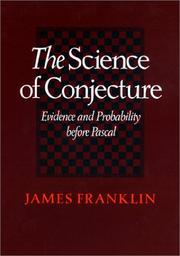| Listing 1 - 1 of 1 |
Sort by
|

ISBN: 1421418819 9781421418810 0801865697 9780801865695 0801871093 9780801871092 Year: 2015 Publisher: [Place of publication not identified] Johns Hopkins University Press
Abstract | Keywords | Export | Availability | Bookmark
 Loading...
Loading...Choose an application
- Reference Manager
- EndNote
- RefWorks (Direct export to RefWorks)
Before Pascal and Fermat's discovery of the mathematics of probability in 1654, how did we make reliable predictions? What methods in law, science, commerce, philosophy, and logic helped us to get at the truth in cases where certainty was not attainable? In 'The Science of Conjecture,' James Franklin examines how judges, witch inquisitors, and juries evaluated evidencescientists weighed reasons for and against scientific theoriesand merchants counted shipwrecks to determine insurance rates. Sometimes this type of reasoning avoided numbers entirely, as in the legal standard of "proof beyond a reasonable doubt"at other times it involved rough numerical estimates, as in gambling odds or the level of risk in chance events. 'The Science of Conjecture' provides a history of rational methods of dealing with uncertainty. Everyone can take a rough account of risk, Franklin argues, but understanding the principles of probability and using them to improve performance poses serious problems, the solution to which we have only learned over many generations and after much trial and error. This study explores the 'coming to consciousness' of the human understanding of risk.
Mathematics --- Physical Sciences & Mathematics --- Mathematical Statistics --- Evidence --- Probabilities --- History.
| Listing 1 - 1 of 1 |
Sort by
|

 Search
Search Feedback
Feedback About UniCat
About UniCat  Help
Help News
News